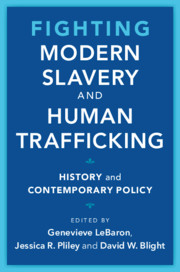Book contents
- Fighting Modern Slavery and Human Trafficking
- Slaveries since Emancipation
- Fighting Modern Slavery and Human Trafficking
- Copyright page
- Contents
- Figures
- Tables
- Contributors
- Preface
- Acknowledgments
- Abbreviations
- 1 Introduction
- 2 Counting Modern Slaves
- 3 Working Analogies
- 4 Free Soil, Free Produce, Free Communities
- 5 Ambivalent Abolitionist Legacies
- 6 Mexico’s New Slavery
- 7 Undermining Labor Power
- 8 A Market in Deception? Ethically Certifying Exploitative Supply Chains
- 9 Preventing Human Trafficking
- 10 Integrated and Indivisible
- Afterword If There Is No Struggle, There Is No Progress
- Index
8 - A Market in Deception? Ethically Certifying Exploitative Supply Chains
Published online by Cambridge University Press: 18 June 2021
- Fighting Modern Slavery and Human Trafficking
- Slaveries since Emancipation
- Fighting Modern Slavery and Human Trafficking
- Copyright page
- Contents
- Figures
- Tables
- Contributors
- Preface
- Acknowledgments
- Abbreviations
- 1 Introduction
- 2 Counting Modern Slaves
- 3 Working Analogies
- 4 Free Soil, Free Produce, Free Communities
- 5 Ambivalent Abolitionist Legacies
- 6 Mexico’s New Slavery
- 7 Undermining Labor Power
- 8 A Market in Deception? Ethically Certifying Exploitative Supply Chains
- 9 Preventing Human Trafficking
- 10 Integrated and Indivisible
- Afterword If There Is No Struggle, There Is No Progress
- Index
Summary
This chapter analyses the growing use of ethical certification schemes as a strategy to fight forced labor in the contemporary global economy. It draws on a large primary dataset from the Global Business of Forced Labour study, collected from 2016–2018, which sheds light into the business models of forced labor in the cocoa and tea industries as well as the effectiveness of ethical certification in combatting forced labor. Drawing on data that demonstrates that ethical certification schemes are failing to create worksites that are free from exploitation, I argue that ethical certification labelling is misleading consumers about the labor conditions involved in the goods they are buying. I explore the contradictions of selling "ethical" products that give the impression that goods have been made through labor standards that they are known to fall short of. I explore the challenge of modernizing historically successful strategies to combat slavery made-goods for use in the present.
Keywords
- Type
- Chapter
- Information
- Fighting Modern Slavery and Human TraffickingHistory and Contemporary Policy, pp. 156 - 178Publisher: Cambridge University PressPrint publication year: 2021
- 1
- Cited by



